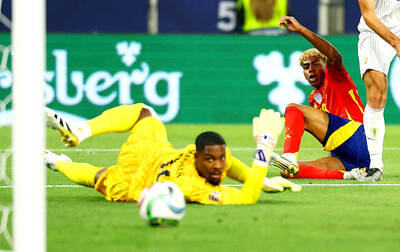For all the glory associated with their famous yellow shirts, Brazil can never shake the sense of unease that descends whenever they find themselves confronted by Uruguay.
Today’s FIFA Confederations Cup semi-final in Belo Horizonte, Brazil, will be the 71st match between the South American neighbors and for Brazilians it will dredge up a 63-year-old nightmare that haunts the Selecao to this day.
The 1950 World Cup finals in Brazil was intended to crown the hosts’ emergence as the world’s best national team, but instead it witnessed their most traumatizing defeat, immortalized as the Maracanazo (Maracana Blow).
A side led by all-action inside-forward Zizinho went into the decisive match at Rio de Janeiro’s newly built Maracana needing only a draw to win the tournament for the first time.
On July 16, the day of the game, Rio newspaper O Mundo carried the headline “These are the world champions” alongside a picture of the team and an estimated 200,000 fans streamed into the giant concrete arena in anticipation of Brazil’s coronation.
Opponents Uruguay, narrow victors over Sweden in their previous game, were offered up as the sacrificial lambs and they seemed destined to fulfill that role when Friaca put Brazil ahead early in the second half.
Juan Alberto Schiaffino then equalized, but Brazil remained on course for the trophy until Uruguay winger Alcides Ghiggia surprised goalkeeper Barbosa with a low shot in the 79th minute that stunned the giant stadium.
“Only three people have ever silenced 200,000 people at the Maracana with a single gesture,” Ghiggia once said. “Frank Sinatra, Pope John Paul II and I.”
Uruguay, not Brazil, were the world champions and the host nation sank into mourning.
Barbosa became an instant scapegoat and played for his country again only once. Reports of suicides abounded.
“Everywhere has its irremediable national catastrophe, something like a Hiroshima,” said Nelson Rodrigues, the Brazilian playwright, journalist and novelist. “Our catastrophe, our Hiroshima, was the defeat by Uruguay in 1950.”
In response, a competition was launched by Rio newspaper Correio da Manha to redesign the uninspiring white strip that Brazil’s players had worn in the final.
The winning entry, submitted by 19-year-old illustrator Aldyr Garcia Schlee, combined the yellow, green and blue of the Brazilian flag and it is worn to this day, but even there, Uruguay played a part.
Schlee was born in the border town of Jaguaro and as he told British author Alex Bellos in the 2002 book Futebol: The Brazilian Way of Life, he grew up supporting the national team from the blue side of the frontier.
Uruguay, the country, spent the first three centuries of its existence being tugged back and forth between the Spanish and Portuguese empires, and it was only granted independence from Brazil in 1828.
It has been wreaking vengeance in the form of guerrilla raids on the soccer pitch ever since.
Brazil’s heaviest defeat, a 6-0 thrashing in September 1920, came at Uruguay’s hands and La Celeste have twice beaten their neighbors in the final of the Copa America.
A Brazil team featuring the great Socrates fell to Uruguay in 1983, while the 1995 Copa America final saw a Brazil side containing five members of the team that had overcome Italy in the previous year’s World Cup final beaten 5-3 on penalties in Montevideo.
Brazil claimed symbolic revenge for the Maracanazo by defeating Uruguay in the 1989 Copa America final at the Maracana, Romario heading in the only goal, but the memory of the 1950 match refuses to fade.
Next year, Brazil’s players will take to the field at a Brazilian World Cup for the first time since Zizinho and his disconsolate teammates left the pitch of the Maracana more than six decades previously.
So although Brazil have since amassed five World Cups and will start as strong favorites against Uruguay today, a victory would represent only partial consolation.

Badminton world No. 3 Anders Antonsen clinched his first Indonesia Open title yesterday after beating Taiwan’s Chou Tien-chen, while South Korea’s An Se-young won her second championship in Jakarta. The 28-year-old Dane sank world No. 7 Chou at the Indonesian capital’s Istora Senayan arena, winning 22-20, 21-14 in a 60-minute match to secure the prestigious Super 1000 event. Antonsen came out on top in a tightly contested first game before cruising to victory in the second. In a more closely fought women’s singles final, South Korean ace and world No. 1 An fought back from one game down to beat China’s

Spain starlets Lamine Yamal and Nico Williams dazzled on Thursday as La Roja beat France 5-4 in a thriller in Stuttgart, Germany, to set up a UEFA Nations League final with Portugal. Yamal bagged a brace, while Williams scored and provided an assist as the two wingers cut France’s makeshift defense to ribbons. Mikel Merino and Pedri were also on the score sheet for the UEFA Euro 2024 champions. Kylian Mbappe netted a second-half penalty, but Spain were 5-1 up and cruising, before Les Bleus suddenly woke up as their opponents took their foot off the pedal. France’s three late goals — a

Italy crashed to a 3-0 loss away to Norway, as the four-time FIFA World Cup champions made a disastrous start to their 2026 World Cup qualifying campaign on Friday, while Belgium had to settle for a draw in North Macedonia. Alexander Sorloth, Antonio Nusa and Erling Haaland all scored in the first half in pouring rain in Oslo as Norway made it a night to forget for Italy, who missed out on the past two World Cups. “I have no explanation. Our supporters don’t deserve this kind of match. We need to do some soul-searching. It’s unacceptable,” Italy captain and goalkeeper Gianluigi

The Crusaders yesterday produced a clinical performance in difficult conditions to beat the Queensland Reds 32-12 and claim home advantage in next week’s Super Rugby semi-finals. Lock Scott Barrett and prop Tamaiti Williams scored first-half tries to reward an outstanding performance from the Crusaders’ forwards in wet, slippery conditions and bitterly cold temperatures. Scrumhalf Noah Hotham defied the conditions in the second half to score a superb solo try and, after kicking a conversion and penalty to make the score 22-0 at the hour mark, flyhalf Rivez Reihana scored a try which took the game beyond the Reds. “Typical Christchurch weather, cold, wet